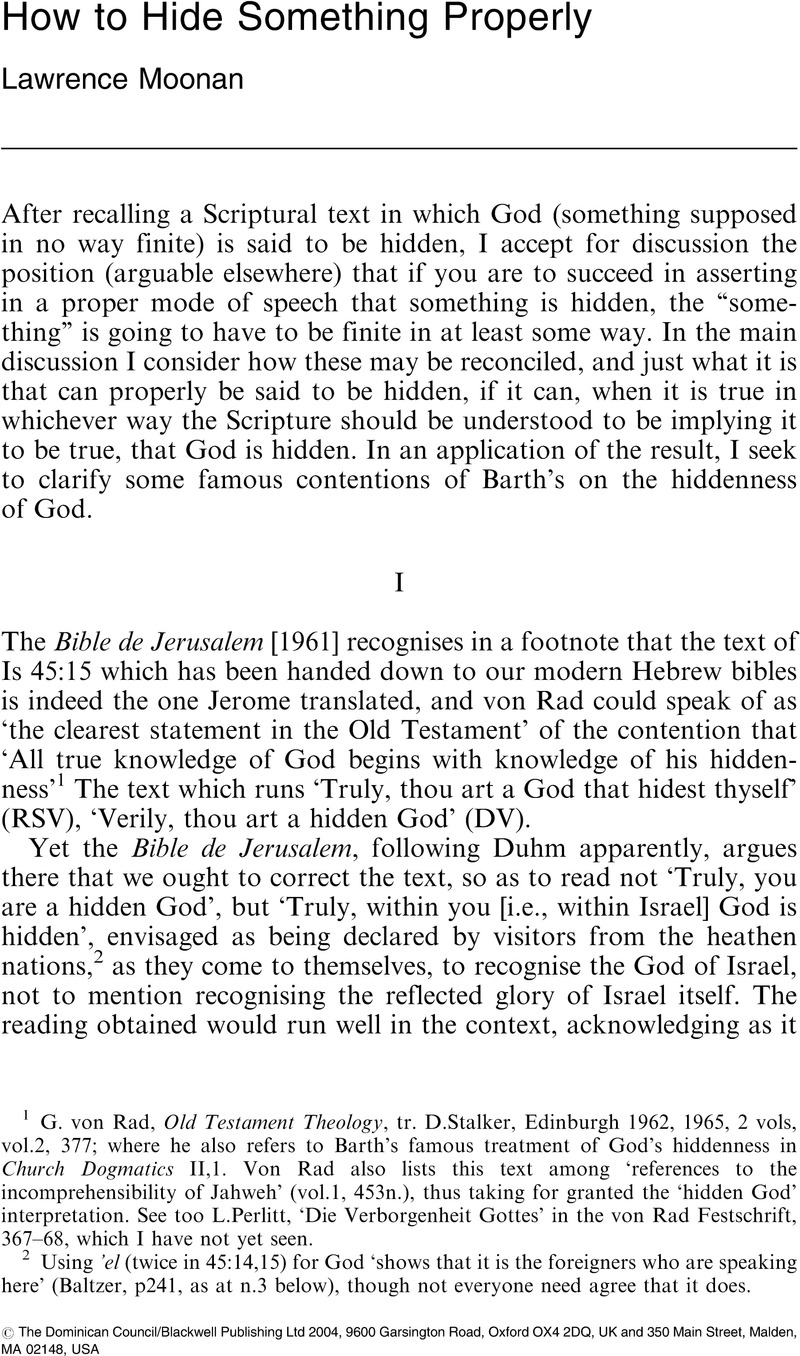No CrossRef data available.
Article contents
How to Hide Something Properly
Published online by Cambridge University Press: 01 January 2024
Abstract

Information
- Type
- Catholic Theological Association 2003 Conference Papers
- Information
- Copyright
- Copyright © The Dominican Council/Blackwell Publishing Ltd 2004
References
1 Rad, G. von, Old Testament Theology, tr. Stalker, D., Edinburgh 1962, 1965, 2 vols, vol.2, 377Google Scholar; where he also refers to Barth's famous treatment of God's hiddenness in Church Dogmatics II,1. Von Rad also lists this text among ‘references to the incomprehensibility of Jahweh’(vol.1, 453n.), thus taking for granted the ‘hidden God’ interpretation. See too L.Perlitt, ‘Die Verborgenheit Gottes’ in the von Rad Festschrift, 367–68, which I have not yet seen.
2 Using ’el(twice in 45:14,15) for God ‘shows that it is the foreigners who are speaking here’(Baltzer, p241, as at n.3 below), though not everyone need agree that it does.
3 ‘If we could emend ‘thou’(attah) to ‘with thee’(ittak), with Duhm and others, we should have to decide for the latter, but the textual evidence for this is slender’(North, C., The Second Isaiah. Introduction, Translation and Commentary to Chapters XL-LV, Oxford [1964]Google Scholar, xii + 290pp., 157. For a distinct variant of the ‘hidden within Israel’ interpretation see Dijkstra, M., ‘Zur Deutung von Jesaja 45:15ff.’, in Zeitschr. f. Alttestamentliche Wissenschaft 89(1977)215–22Google Scholar, summarised at 222: ‘Isa. 45:15 cannot be understood as a prophetic doxology or as a confessional statement by the nations, but is a lamentation of the nation, which is quoted by the prophet as if uttered by his opponents, and is then contested in 45:17–19’. The hithphael in mistatter(‘conceals himself’) can take the sense of ‘shows himself protective’(North, p. 158), and indeed that was how Kissane had translated it: ‘Truly, with thee is a protecting God, The God of Israel is a saviour’(The Book of Isaiah. Translated from a critically revised Hebrew Text with Commentary, vol. 2 (Dublin 1943), p. 84Google Scholar. For further refs see Baltzer, K., tr. Kohl, M., ed. Machinist, P., Deutero-Isaiah. A Commentary on Isaiah 40–55, Minneapolis [2001]Google Scholar xxv + 597pp.
Jerome notes that in Theodotion the passage runs ‘In te est fortis, et non est alius praeter eum deus; propterea tu fortis, absconditus deus salvator’. See Commentaires de Jerome sur le prophete Isaie. Introduction R.Gryson, Livres XII-XV, Texte etabli par R.Gryson & C.Gabriel, avec la collaboration de H.Bourgois & V.Leclercq, Freiburg 1998, p. 1376.
4 See, for example, W.V.O.Quine, ‘Existence and quantification’, printed as Ch.4 of Ontological Relativity and other Essays, New York [1969]. Quine's ontology, of entities in some way determinate, is arguably a reliable regional ontology for all possible objects of science, whether or not it should be taken to hold for things unrestrictedly.
5 Cf. Barth, Church Dogmatics II,1, p. 189: ‘we do not really know what we are saying when we say ‘God’, no matter whether we try to express it by this word or any other word’.
6 And the ‘sum of things’ itself is not necessarily more than a sense-array, if you want to be awkward.
7 Christopher North finds warrant usable for such a doctrine in Is 45: 18, ‘It is an orderly creation, not a chaos (tohu, see on xl.17 and cf. Gen.i.2) but a habitable world’(North, The Second Isaiah…1964, 159); and in 45:19, ‘Not only is Yahweh's creation orderly but his word is clear. He has never spoken in secrecy(cf. xlviii.16), in some place in the land of darkness(hosek)’(same p. 159), North's emphasis.
8 Church Dogmatics II,1, p. 183.
9 Church Dogmatics II,1, p. 184; and cf. p. 183: ‘When we say that God is hidden, we are not speaking of ourselves, but, taught by God's revelation alone, of God’(emphasis from me). If ‘we’ is being understood to refer to Christians, then ‘we’ could choose to argue only from premisses and only under pragmatic restrictions accepted because be believe them to be Revealed. But in that case Barth would be making his contention trivially true. I do not see how he either can or needs to exclude the non-trivial possibility mentioned above, of philosophers asserting the substance of Barth's claim (‘between God and man, as between God and creature in general, there exists an irrevocable otherness…’) on non-Revealed grounds.
10 Aquinas, recognising this, added that in this unique case our ignorance could not matter, as no more than one truth – the unique truth justified in virtue of the existence of something strictly infinite – can be in question, no matter how many different expressions we might use to assert it.
11 Church Dogmatics II,1, p. 189.
12 E.g., Est autem impossibile quod aliqua creatura comprehendat divinam essentiam, sicut in Prima Parte dictum est (qu.12 a.7): eo quod infinitum non comprehenditur a finito. Et ideo dicendum quod anima Christi nullo modo comprehendit divinam essentiam.

